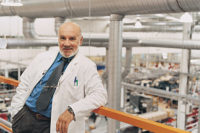DETROIT-Building on the momentum they've generated over the past year, following years of restructuring, U.S. auto executives expect improvements in revenue and hiring next year and intend to boost investment in acquisitions and product innovations, according to a recent survey by KPMG LLP, the audit, tax and advisory firm.
In the KPMG survey, 73% of auto executives say their companies have increased revenue over last year, and 72% say revenues will continue to increase next year, as well. In addition, more than half of the executives indicate that they've added personnel since last year, and nearly two-thirds (62%) say their companies will continue to add employees next year, including 19% who predict headcount will rise by more than 7% in 2012.
"The survey results clearly demonstrate that the restructuring efforts of the past several years have helped U.S. auto manufacturers emerge more efficient and more competitive," says Gary Silberg, national automotive industry leader for KPMG LLP. "Another indication that the industry is getting healthier is that these execs are telling us capital investment will get a boost even though most only expect modest improvement in the U.S. economy next year. These companies have cash on hand and are ready to put it to work."
In fact, 69% of auto executives indicate that their companies have significant cash on their balance sheets, and 71% say their companies will increase capital spending next year. The highest-priority investment areas for these executives are new models/products, new technologies and strategic acquisitions.
Fifty-five percent of the executives surveyed by KPMG say it is likely that their company will be involved in a merger or acquisition as a buyer, while 5% say they'll be sellers. Executives indicate the key drivers behind the M&A activity over the next year will be access to new markets and customers, and access to new technologies and products.
According to KPMG's Silberg, companies are flush with cash and more than two-thirds of survey respondents say their company's ability to get financing has improved since last year. "This improved capital position allows U.S. auto manufacturers to be more aggressive to drive growth and product innovation, and sets the stage for an active M&A environment," adds Silberg.
When asked what the key drivers of the projected revenue growth would be over the next three years, auto executives most frequently cited expansion into new geographic markets (53%), new models/products (48%), and acquisitions/joint ventures (39%).
In addition, the majority of auto executives surveyed indicate that North America is the primary growth market for their companies, followed by China and South America.
"Even though our economic recovery remains weak, there is pent-up demand for vehicles in the United States," said KPMG's Silberg. "And while current sales are not at their historic levels, the uptick we've seen over the past 18 months is clearly a good sign that things are headed in the right direction again for U.S. automakers."
While auto executives express cautious optimism about company revenue, growth, and hiring plans, they do so "against the backdrop of a tough economy," says Silberg. "They are not projecting an economic turnaround for years."
In fact, 83% of respondents to the KPMG survey predict the U.S. economy will remain flat or see only moderate improvement next year, with 61% saying a full economic recovery won't happen until 2013-2014 or later.
Beyond the economy, auto manufacturers continue to point to growth barriers such as pricing pressures, volatile commodity and input prices, and regulatory pressures. Specifically, when asked about government regulation that will have the most impact on the auto industry, executives most frequently cited the corporate average fuel economy (CAFE) standards (52%), emissions standards (50%), and healthcare reform (44%).
According to the KPMG survey, concerns about supply chain management also exist for auto executives. Respondents point to rising commodity costs, capacity, and disruption of supply as the most significant challenges in their supply chain. Additionally, they say the most significant opportunities for improvement in supply chain are better communication/supplier relationships, revised sourcing locations, and accelerated innovation from suppliers.
The KPMG survey was conducted in June 2011 and reflects the responses of 100 senior executives in the auto industry. Based on revenue in the most recent fiscal year, 28% of respondents work for institutions with annual revenues exceeding $10 billion, 33% with annual revenues in the $1 billion to $10 billion range, and 40% with revenues in the $100 million to $1 billion range.
KPMG Survey: U.S. Auto Executives Optimistic on Revenue, Hiring Next Year
Looking for a reprint of this article?
From high-res PDFs to custom plaques, order your copy today!



